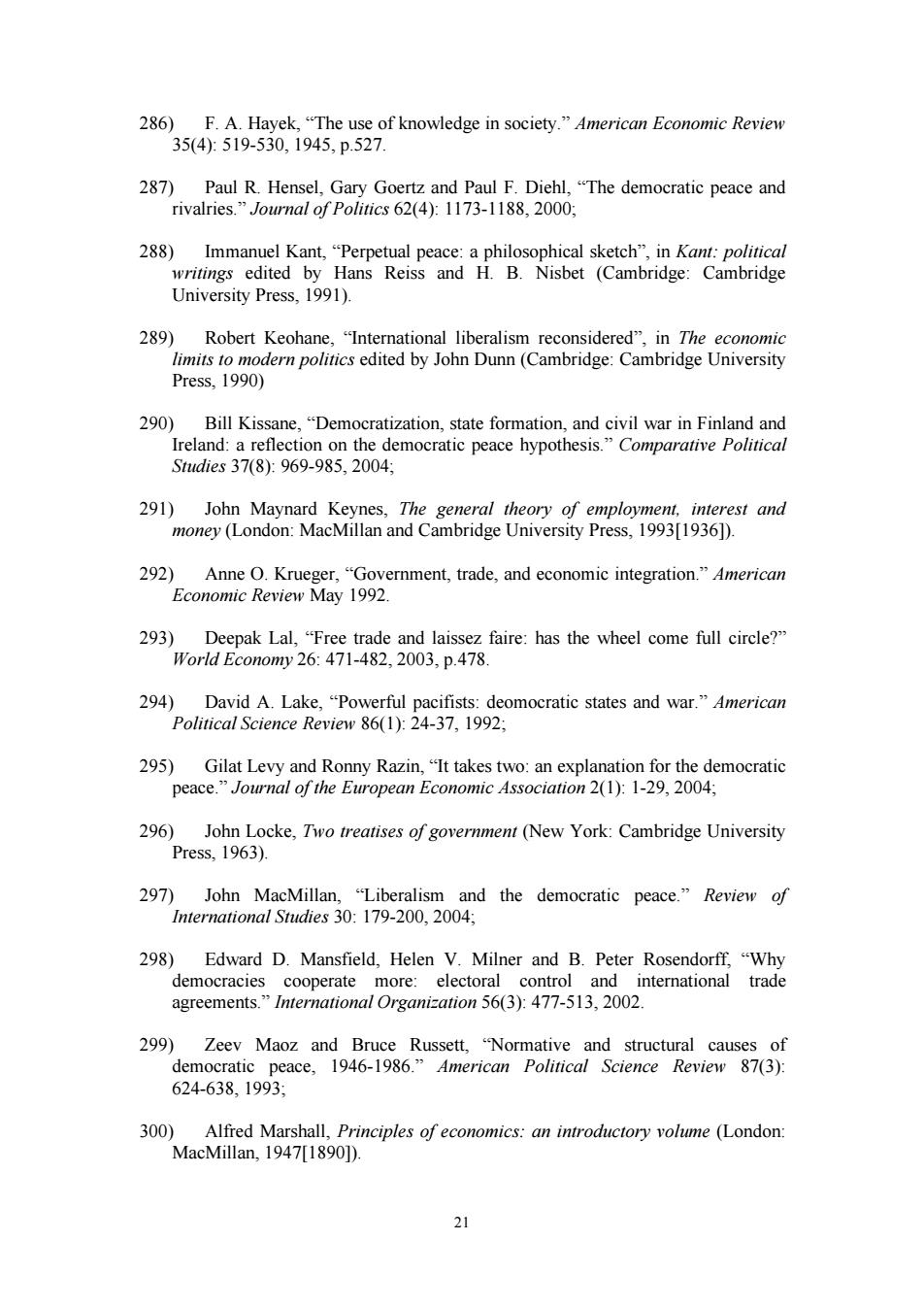
286)F.A.Hayek,"The use of knowledge in society."American Economic Review 35(4):519-530,1945,p.527. 287)Paul R.Hensel,Gary Goertz and Paul F.Diehl,"The democratic peace and rivalries."Journal of Politics 62(4):1173-1188,2000; 288)Immanuel Kant,"Perpetual peace:a philosophical sketch",in Kant:political writings edited by Hans Reiss and H.B.Nisbet (Cambridge:Cambridge University Press,1991). 289)Robert Keohane,"International liberalism reconsidered",in The economic limits to modern politics edited by John Dunn(Cambridge:Cambridge University Press,1990) 290)Bill Kissane,"Democratization,state formation,and civil war in Finland and Ireland:a reflection on the democratic peace hypothesis."Comparative Political Studies37(8):969-985,2004; 291)John Maynard Keynes,The general theory of employment,interest and money (London:MacMillan and Cambridge University Press,1993[1936]). 292)Anne O.Krueger,"Government,trade,and economic integration."American Economic Review May 1992. 293)Deepak Lal,"Free trade and laissez faire:has the wheel come full circle?" World Economy26:471-482,2003,p.478 294)David A.Lake,"Powerful pacifists:deomocratic states and war."American Political Science Review 86(1):24-37,1992; 295)Gilat Levy and Ronny Razin,"It takes two:an explanation for the democratic peace."Journal of the European Economic Association 2(1):1-29,2004; 296)John Locke,Two treatises of government (New York:Cambridge University Press,1963). 297)John MacMillan,"Liberalism and the democratic peace."Review of International Studies 30:179-200,2004; 298)Edward D.Mansfield,Helen V.Milner and B.Peter Rosendorff,"Why democracies cooperate more:electoral control and international trade agreements."International Organization 56(3):477-513,2002. 299)Zeev Maoz and Bruce Russett,"Normative and structural causes of democratic peace,1946-1986."American Political Science Review 87(3): 624-638,1993; 300)Alfred Marshall,Principles of economics:an introductory volume (London: MacMillan,1947[1890]). 21
21 286) F. A. Hayek, “The use of knowledge in society.” American Economic Review 35(4): 519-530, 1945, p.527. 287) Paul R. Hensel, Gary Goertz and Paul F. Diehl, “The democratic peace and rivalries.” Journal of Politics 62(4): 1173-1188, 2000; 288) Immanuel Kant, “Perpetual peace: a philosophical sketch”, in Kant: political writings edited by Hans Reiss and H. B. Nisbet (Cambridge: Cambridge University Press, 1991). 289) Robert Keohane, “International liberalism reconsidered”, in The economic limits to modern politics edited by John Dunn (Cambridge: Cambridge University Press, 1990) 290) Bill Kissane, “Democratization, state formation, and civil war in Finland and Ireland: a reflection on the democratic peace hypothesis.” Comparative Political Studies 37(8): 969-985, 2004; 291) John Maynard Keynes, The general theory of employment, interest and money (London: MacMillan and Cambridge University Press, 1993[1936]). 292) Anne O. Krueger, “Government, trade, and economic integration.” American Economic Review May 1992. 293) Deepak Lal, “Free trade and laissez faire: has the wheel come full circle?” World Economy 26: 471-482, 2003, p.478. 294) David A. Lake, “Powerful pacifists: deomocratic states and war.” American Political Science Review 86(1): 24-37, 1992; 295) Gilat Levy and Ronny Razin, “It takes two: an explanation for the democratic peace.” Journal of the European Economic Association 2(1): 1-29, 2004; 296) John Locke, Two treatises of government (New York: Cambridge University Press, 1963). 297) John MacMillan, “Liberalism and the democratic peace.” Review of International Studies 30: 179-200, 2004; 298) Edward D. Mansfield, Helen V. Milner and B. Peter Rosendorff, “Why democracies cooperate more: electoral control and international trade agreements.” International Organization 56(3): 477-513, 2002. 299) Zeev Maoz and Bruce Russett, “Normative and structural causes of democratic peace, 1946-1986.” American Political Science Review 87(3): 624-638, 1993; 300) Alfred Marshall, Principles of economics: an introductory volume (London: MacMillan, 1947[1890])
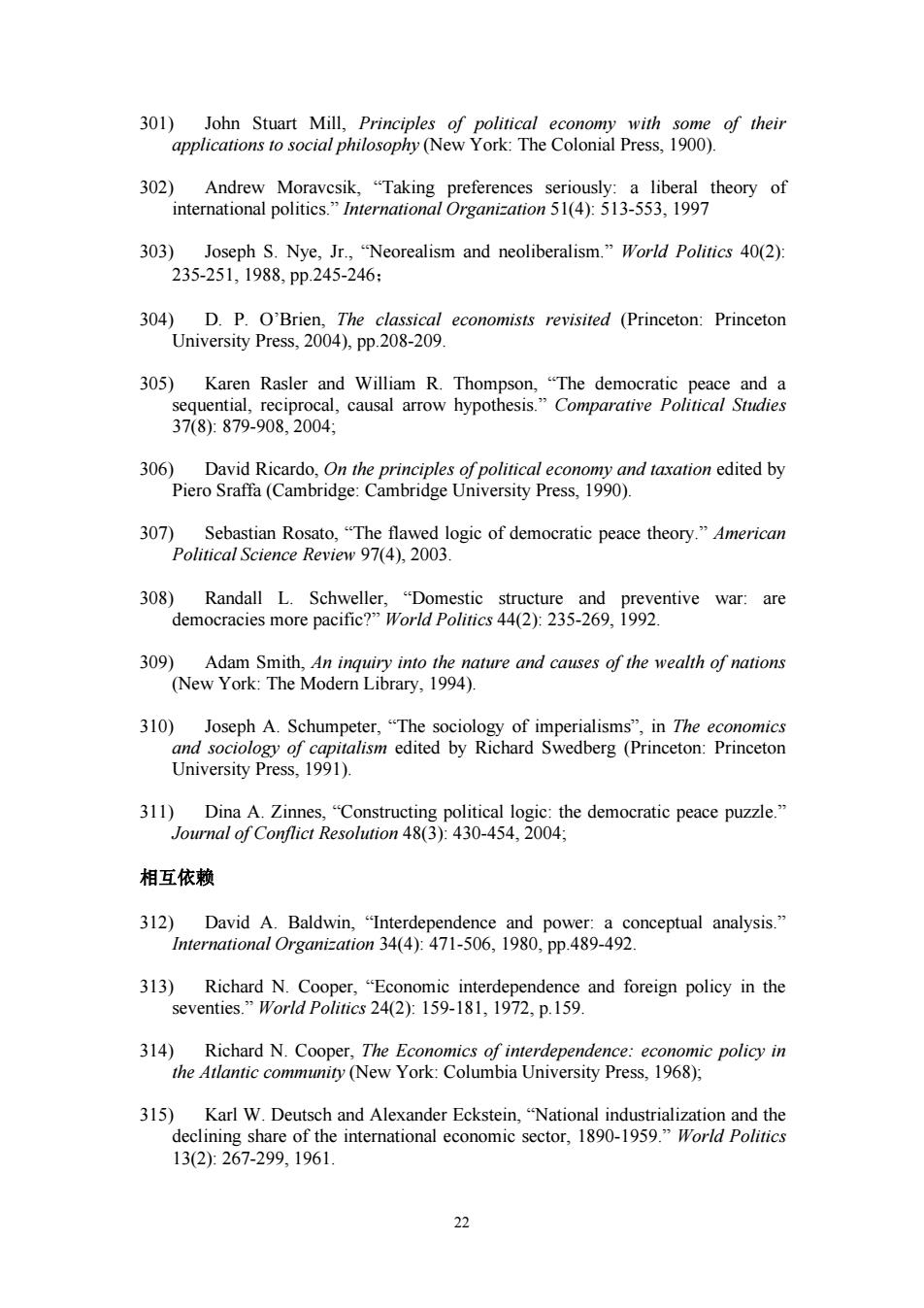
301)John Stuart Mill,Principles of political economy with some of their applications to social philosophy (New York:The Colonial Press,1900). 302)Andrew Moravesik,"Taking preferences seriously:a liberal theory of international politics."International Organization 51(4):513-553,1997 303)Joseph S.Nye,Jr.,"Neorealism and neoliberalism."World Politics 40(2): 235-251,1988,Pp.245-246: 304)D.P.O'Brien,The classical economists revisited (Princeton:Princeton University Press,2004),pp.208-209. 305)Karen Rasler and William R.Thompson,"The democratic peace and a sequential,reciprocal,causal arrow hypothesis."Comparative Political Studies 37(8):879-908,2004; 306)David Ricardo,On the principles of political economy and taxation edited by Piero Sraffa(Cambridge:Cambridge University Press,1990). 307)Sebastian Rosato,"The flawed logic of democratic peace theory."American Political Science Review 97(4),2003. 308)Randall L.Schweller,"Domestic structure and preventive war:are democracies more pacific?"World Politics 44(2):235-269,1992. 309)Adam Smith,An inguiry into the nature and causes of the wealth of nations (New York:The Modern Library,1994). 310)Joseph A.Schumpeter,"The sociology of imperialisms",in The economics and sociology of capitalism edited by Richard Swedberg (Princeton:Princeton University Press,1991). 311)Dina A.Zinnes,"Constructing political logic:the democratic peace puzzle." Journal of Conflict Resolution 48(3):430-454,2004; 相互依赖 312)David A.Baldwin,"Interdependence and power:a conceptual analysis." International Organization 34(4):471-506,1980,pp.489-492. 313)Richard N.Cooper,"Economic interdependence and foreign policy in the seventies."World Politics 24(2):159-181,1972,p.159 314)Richard N.Cooper,The Economics of interdependence:economic policy in the Atlantic community (New York:Columbia University Press,1968); 315)Karl W.Deutsch and Alexander Eckstein,"National industrialization and the declining share of the international economic sector,1890-1959."World Politics 13(2:267-299,1961. 22
22 301) John Stuart Mill, Principles of political economy with some of their applications to social philosophy (New York: The Colonial Press, 1900). 302) Andrew Moravcsik, “Taking preferences seriously: a liberal theory of international politics.” International Organization 51(4): 513-553, 1997 303) Joseph S. Nye, Jr., “Neorealism and neoliberalism.” World Politics 40(2): 235-251, 1988, pp.245-246; 304) D. P. O’Brien, The classical economists revisited (Princeton: Princeton University Press, 2004), pp.208-209. 305) Karen Rasler and William R. Thompson, “The democratic peace and a sequential, reciprocal, causal arrow hypothesis.” Comparative Political Studies 37(8): 879-908, 2004; 306) David Ricardo, On the principles of political economy and taxation edited by Piero Sraffa (Cambridge: Cambridge University Press, 1990). 307) Sebastian Rosato, “The flawed logic of democratic peace theory.” American Political Science Review 97(4), 2003. 308) Randall L. Schweller, “Domestic structure and preventive war: are democracies more pacific?” World Politics 44(2): 235-269, 1992. 309) Adam Smith, An inquiry into the nature and causes of the wealth of nations (New York: The Modern Library, 1994). 310) Joseph A. Schumpeter, “The sociology of imperialisms”, in The economics and sociology of capitalism edited by Richard Swedberg (Princeton: Princeton University Press, 1991). 311) Dina A. Zinnes, “Constructing political logic: the democratic peace puzzle.” Journal of Conflict Resolution 48(3): 430-454, 2004; 相互依赖 312) David A. Baldwin, “Interdependence and power: a conceptual analysis.” International Organization 34(4): 471-506, 1980, pp.489-492. 313) Richard N. Cooper, “Economic interdependence and foreign policy in the seventies.” World Politics 24(2): 159-181, 1972, p.159. 314) Richard N. Cooper, The Economics of interdependence: economic policy in the Atlantic community (New York: Columbia University Press, 1968); 315) Karl W. Deutsch and Alexander Eckstein, “National industrialization and the declining share of the international economic sector, 1890-1959.” World Politics 13(2): 267-299, 1961
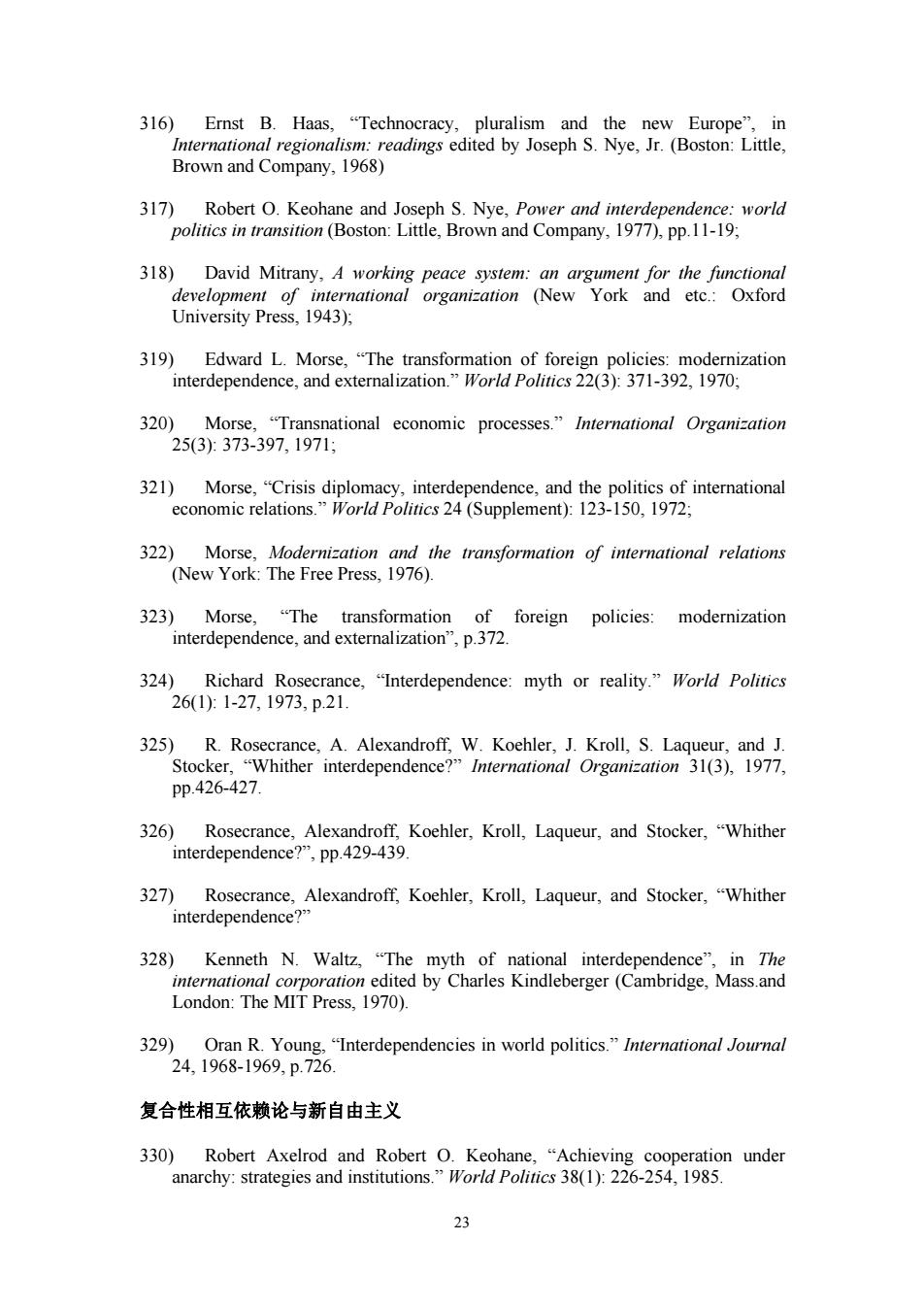
316)Ernst B.Haas,"Technocracy,pluralism and the new Europe",in International regionalism:readings edited by Joseph S.Nye,Jr.(Boston:Little, Brown and Company,1968) 317)Robert O.Keohane and Joseph S.Nye,Power and interdependence:world politics in transition (Boston:Little,Brown and Company,1977),pp.11-19; 318)David Mitrany,A working peace system:an argument for the functional development of international organization (New York and etc.:Oxford University Press,1943); 319)Edward L.Morse,"The transformation of foreign policies:modernization interdependence,and externalization."World Politics 22(3):371-392,1970; 320)Morse,"Transnational economic processes."International Organization 25(3):373-397,1971; 321)Morse,"Crisis diplomacy,interdependence,and the politics of international economic relations."World Politics 24 (Supplement):123-150,1972; 322)Morse,Modernization and the transformation of international relations (New York:The Free Press,1976). 323)Morse,"The transformation of foreign policies:modernization interdependence,and externalization",p.372 324)Richard Rosecrance,"Interdependence:myth or reality."World Politics 261):1-27,1973,p.21. 325)R.Rosecrance,A.Alexandroff,W.Koehler,J.Kroll,S.Laqueur,and J. Stocker,"Whither interdependence?"International Organization 31(3),1977, pp.426-427 326)Rosecrance,Alexandroff,Koehler,Kroll,Laqueur,and Stocker,"Whither interdependence?",pp.429-439. 327)Rosecrance,Alexandroff,Koehler,Kroll,Laqueur,and Stocker,"Whither interdependence?” 328) Kenneth N.Waltz,"The myth of national interdependence",in The international corporation edited by Charles Kindleberger (Cambridge,Mass.and London:The MIT Press,1970). 329)Oran R.Young,"Interdependencies in world politics."International Journal 24,1968-1969,p.726. 复合性相互依赖论与新自由主义 330)Robert Axelrod and Robert O.Keohane,"Achieving cooperation under anarchy:strategies and institutions."World Politics 38(1):226-254,1985. 23
23 316) Ernst B. Haas, “Technocracy, pluralism and the new Europe”, in International regionalism: readings edited by Joseph S. Nye, Jr. (Boston: Little, Brown and Company, 1968) 317) Robert O. Keohane and Joseph S. Nye, Power and interdependence: world politics in transition (Boston: Little, Brown and Company, 1977), pp.11-19; 318) David Mitrany, A working peace system: an argument for the functional development of international organization (New York and etc.: Oxford University Press, 1943); 319) Edward L. Morse, “The transformation of foreign policies: modernization interdependence, and externalization.” World Politics 22(3): 371-392, 1970; 320) Morse, “Transnational economic processes.” International Organization 25(3): 373-397, 1971; 321) Morse, “Crisis diplomacy, interdependence, and the politics of international economic relations.” World Politics 24 (Supplement): 123-150, 1972; 322) Morse, Modernization and the transformation of international relations (New York: The Free Press, 1976). 323) Morse, “The transformation of foreign policies: modernization interdependence, and externalization”, p.372. 324) Richard Rosecrance, “Interdependence: myth or reality.” World Politics 26(1): 1-27, 1973, p.21. 325) R. Rosecrance, A. Alexandroff, W. Koehler, J. Kroll, S. Laqueur, and J. Stocker, “Whither interdependence?” International Organization 31(3), 1977, pp.426-427. 326) Rosecrance, Alexandroff, Koehler, Kroll, Laqueur, and Stocker, “Whither interdependence?”, pp.429-439. 327) Rosecrance, Alexandroff, Koehler, Kroll, Laqueur, and Stocker, “Whither interdependence?” 328) Kenneth N. Waltz, “The myth of national interdependence”, in The international corporation edited by Charles Kindleberger (Cambridge, Mass.and London: The MIT Press, 1970). 329) Oran R. Young, “Interdependencies in world politics.” International Journal 24, 1968-1969, p.726. 复合性相互依赖论与新自由主义 330) Robert Axelrod and Robert O. Keohane, “Achieving cooperation under anarchy: strategies and institutions.” World Politics 38(1): 226-254, 1985
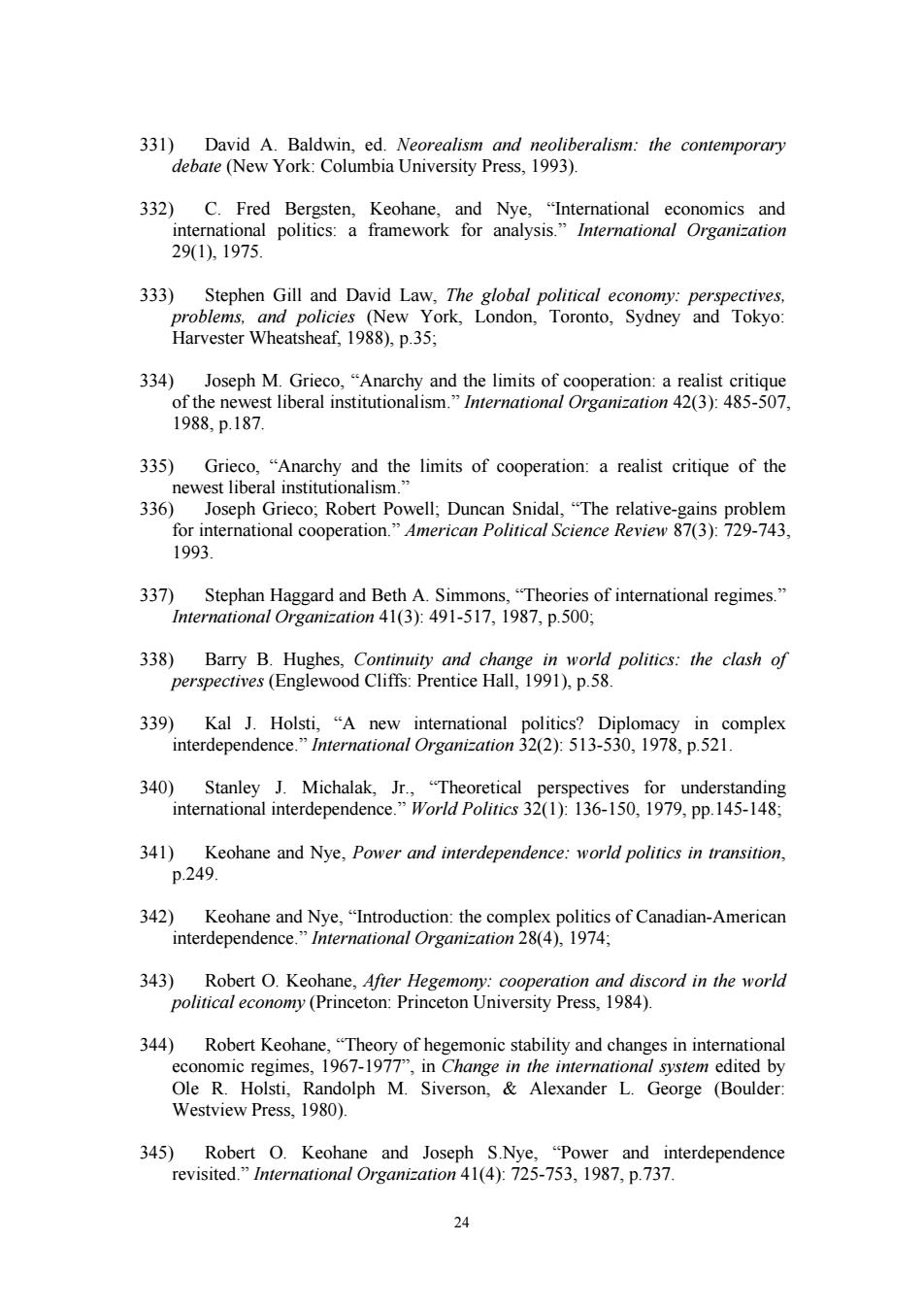
331)David A.Baldwin,ed.Neorealism and neoliberalism:the contemporary debate (New York:Columbia University Press,1993). 332)C.Fred Bergsten,Keohane,and Nye,"International economics and international politics:a framework for analysis."International Organization 291),1975. 333)Stephen Gill and David Law,The global political economy:perspectives, problems,and policies (New York,London,Toronto,Sydney and Tokyo: Harvester Wheatsheaf,1988),p.35; 334)Joseph M.Grieco,"Anarchy and the limits of cooperation:a realist critique of the newest liberal institutionalism."International Organization 42(3):485-507, 1988,p.187. 335)Grieco,"Anarchy and the limits of cooperation:a realist critique of the newest liberal institutionalism." 336)Joseph Grieco;Robert Powell;Duncan Snidal,"The relative-gains problem for international cooperation."American Political Science Review 87(3):729-743. 1993 337)Stephan Haggard and Beth A.Simmons,"Theories of international regimes." International Organization 41(3):491-517,1987,p.500; 338)Barry B.Hughes,Continuity and change in world politics:the clash of perspectives (Englewood Cliffs:Prentice Hall,1991),p.58 339)Kal J.Holsti,"A new international politics?Diplomacy in complex interdependence."International Organization 32(2):513-530,1978,p.521. 340)Stanley J.Michalak,Jr.,"Theoretical perspectives for understanding international interdependence."World Politics 32(1):136-150,1979,pp.145-148; 341)Keohane and Nye,Power and interdependence:world politics in transition, p.249. 342)Keohane and Nye,"Introduction:the complex politics of Canadian-American interdependence."International Organization 28(4),1974; 343)Robert O.Keohane,After Hegemony:cooperation and discord in the world political economy(Princeton:Princeton University Press,1984). 344)Robert Keohane,"Theory of hegemonic stability and changes in international economic regimes,1967-1977",in Change in the international system edited by Ole R.Holsti,Randolph M.Siverson,Alexander L.George (Boulder: Westview Press,1980). 345)Robert O.Keohane and Joseph S.Nye,"Power and interdependence revisited."International Organization 41(4):725-753,1987,p.737. 24
24 331) David A. Baldwin, ed. Neorealism and neoliberalism: the contemporary debate (New York: Columbia University Press, 1993). 332) C. Fred Bergsten, Keohane, and Nye, “International economics and international politics: a framework for analysis.” International Organization 29(1), 1975. 333) Stephen Gill and David Law, The global political economy: perspectives, problems, and policies (New York, London, Toronto, Sydney and Tokyo: Harvester Wheatsheaf, 1988), p.35; 334) Joseph M. Grieco, “Anarchy and the limits of cooperation: a realist critique of the newest liberal institutionalism.” International Organization 42(3): 485-507, 1988, p.187. 335) Grieco, “Anarchy and the limits of cooperation: a realist critique of the newest liberal institutionalism.” 336) Joseph Grieco; Robert Powell; Duncan Snidal, “The relative-gains problem for international cooperation.” American Political Science Review 87(3): 729-743, 1993. 337) Stephan Haggard and Beth A. Simmons, “Theories of international regimes.” International Organization 41(3): 491-517, 1987, p.500; 338) Barry B. Hughes, Continuity and change in world politics: the clash of perspectives (Englewood Cliffs: Prentice Hall, 1991), p.58. 339) Kal J. Holsti, “A new international politics? Diplomacy in complex interdependence.” International Organization 32(2): 513-530, 1978, p.521. 340) Stanley J. Michalak, Jr., “Theoretical perspectives for understanding international interdependence.” World Politics 32(1): 136-150, 1979, pp.145-148; 341) Keohane and Nye, Power and interdependence: world politics in transition, p.249. 342) Keohane and Nye, “Introduction: the complex politics of Canadian-American interdependence.” International Organization 28(4), 1974; 343) Robert O. Keohane, After Hegemony: cooperation and discord in the world political economy (Princeton: Princeton University Press, 1984). 344) Robert Keohane, “Theory of hegemonic stability and changes in international economic regimes, 1967-1977”, in Change in the international system edited by Ole R. Holsti, Randolph M. Siverson, & Alexander L. George (Boulder: Westview Press, 1980). 345) Robert O. Keohane and Joseph S.Nye, “Power and interdependence revisited.” International Organization 41(4): 725-753, 1987, p.737
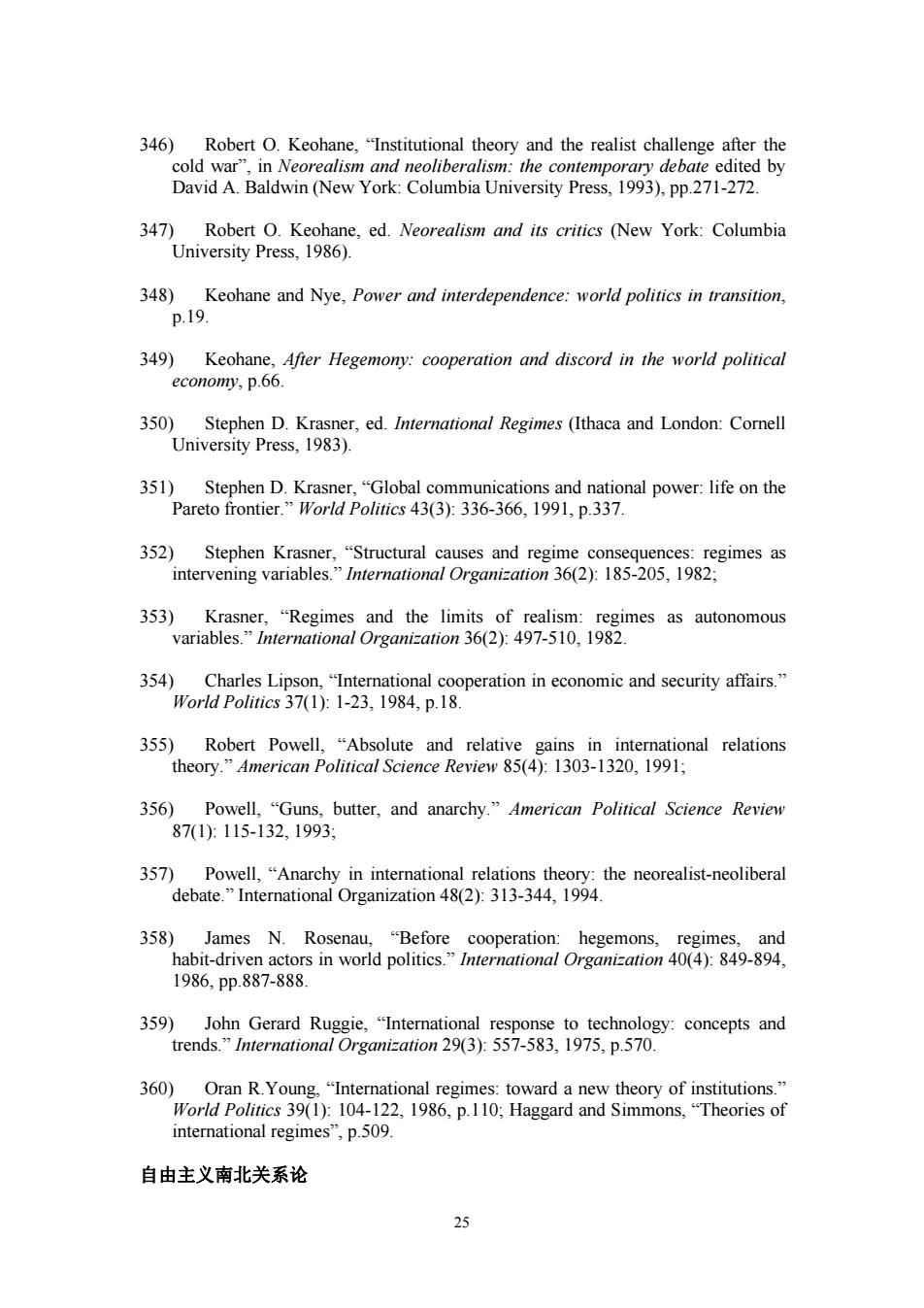
346)Robert O.Keohane,"Institutional theory and the realist challenge after the cold war",in Neorealism and neoliberalism:the contemporary debate edited by David A.Baldwin (New York:Columbia University Press,1993),pp.271-272. 347)Robert O.Keohane,ed.Neorealism and its critics (New York:Columbia University Press,1986). 348)Keohane and Nye,Power and interdependence:world politics in transition, p.19. 349)Keohane,Afier Hegemony:cooperation and discord in the world political economy,p.66. 350)Stephen D.Krasner,ed.International Regimes (Ithaca and London:Cornell University Press,1983). 351)Stephen D.Krasner,"Global communications and national power:life on the Pareto frontier."World Politics 43(3):336-366,1991,p.337. 352)Stephen Krasner,"Structural causes and regime consequences:regimes as intervening variables."International Organization 36(2):185-205,1982; 353)Krasner,"Regimes and the limits of realism:regimes as autonomous variables."International Organization 36(2):497-510,1982 354)Charles Lipson,"International cooperation in economic and security affairs." World Politics 37(1):1-23,1984,p.18. 355)Robert Powell,"Absolute and relative gains in international relations theory."American Political Science Review 85(4):1303-1320,1991; 356)Powell,"Guns,butter,and anarchy."American Political Science Review 87(1):115-132,1993; 357)Powell,"Anarchy in international relations theory:the neorealist-neoliberal debate.International Organization 48(2):313-344,1994. 358)James N.Rosenau,"Before cooperation:hegemons,regimes,and habit-driven actors in world politics."International Organization 40(4):849-894, 1986,pp.887-888. 359)John Gerard Ruggie,"International response to technology:concepts and trends."International Organization 29(3):557-583,1975,p.570. 360)Oran R.Young,"International regimes:toward a new theory of institutions." World Politics 39(1):104-122,1986,p.110;Haggard and Simmons,"Theories of international regimes",p.509. 自由主义南北关系论 25
25 346) Robert O. Keohane, “Institutional theory and the realist challenge after the cold war”, in Neorealism and neoliberalism: the contemporary debate edited by David A. Baldwin (New York: Columbia University Press, 1993), pp.271-272. 347) Robert O. Keohane, ed. Neorealism and its critics (New York: Columbia University Press, 1986). 348) Keohane and Nye, Power and interdependence: world politics in transition, p.19. 349) Keohane, After Hegemony: cooperation and discord in the world political economy, p.66. 350) Stephen D. Krasner, ed. International Regimes (Ithaca and London: Cornell University Press, 1983). 351) Stephen D. Krasner, “Global communications and national power: life on the Pareto frontier.” World Politics 43(3): 336-366, 1991, p.337. 352) Stephen Krasner, “Structural causes and regime consequences: regimes as intervening variables.” International Organization 36(2): 185-205, 1982; 353) Krasner, “Regimes and the limits of realism: regimes as autonomous variables.” International Organization 36(2): 497-510, 1982. 354) Charles Lipson, “International cooperation in economic and security affairs.” World Politics 37(1): 1-23, 1984, p.18. 355) Robert Powell, “Absolute and relative gains in international relations theory.” American Political Science Review 85(4): 1303-1320, 1991; 356) Powell, “Guns, butter, and anarchy.” American Political Science Review 87(1): 115-132, 1993; 357) Powell, “Anarchy in international relations theory: the neorealist-neoliberal debate.” International Organization 48(2): 313-344, 1994. 358) James N. Rosenau, “Before cooperation: hegemons, regimes, and habit-driven actors in world politics.” International Organization 40(4): 849-894, 1986, pp.887-888. 359) John Gerard Ruggie, “International response to technology: concepts and trends.” International Organization 29(3): 557-583, 1975, p.570. 360) Oran R.Young, “International regimes: toward a new theory of institutions.” World Politics 39(1): 104-122, 1986, p.110; Haggard and Simmons, “Theories of international regimes”, p.509. 自由主义南北关系论